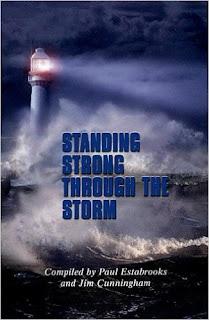The Daily Readings
SATURDAY, September 19, 2020
Psalm 105:1-6, 37-45; Exodus 16:22-30; Matthew 19:23-30
The Holy Bible, King James Version (KJV)
Today’s Verse-of-the-Day: Ephesians 4:29
Let no corrupt communication proceed out of your mouth, but that which is good to the use of edifying, that it may minister grace unto the hearers.
Today’s Readings:
Remembering the wilderness
1 O give thanks unto the Lord; call upon his name: make known his deeds among the people.
2 Sing unto him, sing psalms unto him: talk ye of all his wondrous works.
3 Glory ye in his holy name: let the heart of them rejoice that seek the Lord.
4 Seek the Lord, and his strength: seek his face evermore.
5 Remember his marvellous works that he hath done; his wonders, and the judgments of his mouth;
6 O ye seed of Abraham his servant, ye children of Jacob his chosen.
37 He brought them forth also with silver and gold: and there was not one feeble person among their tribes.
38 Egypt was glad when they departed: for the fear of them fell upon them.
39 He spread a cloud for a covering; and fire to give light in the night.
40 The people asked, and he brought quails, and satisfied them with the bread of heaven.
41 He opened the rock, and the waters gushed out; they ran in the dry places like a river.
42 For he remembered his holy promise, and Abraham his servant.
43 And he brought forth his people with joy, and his chosen with gladness:
44 And gave them the lands of the heathen: and they inherited the labour of the people;
45 That they might observe his statutes, and keep his laws. Praise ye the Lord.
Manna and the sabbath
16:22 And it came to pass, that on the sixth day they gathered twice as much bread, two omers for one man: and all the rulers of the congregation came and told Moses.
23 And he said unto them, This is that which the Lord hath said, To morrow is the rest of the holy sabbath unto the Lord: bake that which ye will bake to day, and seethe that ye will seethe; and that which remaineth over lay up for you to be kept until the morning.
24 And they laid it up till the morning, as Moses bade: and it did not stink, neither was there any worm therein.
25 And Moses said, Eat that to day; for to day is a sabbath unto the Lord: to day ye shall not find it in the field.
26 Six days ye shall gather it; but on the seventh day, which is the sabbath, in it there shall be none.
27 And it came to pass, that there went out some of the people on the seventh day for to gather, and they found none.
28 And the Lord said unto Moses, How long refuse ye to keep my commandments and my laws?
29 See, for that the Lord hath given you the sabbath, therefore he giveth you on the sixth day the bread of two days; abide ye every man in his place, let no man go out of his place on the seventh day.
30 So the people rested on the seventh day.
The last will be first
19:23 Then said Jesus unto his disciples, Verily I say unto you, That a rich man shall hardly enter into the kingdom of heaven.
24 And again I say unto you, It is easier for a camel to go through the eye of a needle, than for a rich man to enter into the kingdom of God.
25 When his disciples heard it, they were exceedingly amazed, saying, Who then can be saved?
26 But Jesus beheld them, and said unto them, With men this is impossible; but with God all things are possible.
27 Then answered Peter and said unto him, Behold, we have forsaken all, and followed thee; what shall we have therefore?
28 And Jesus said unto them, Verily I say unto you, That ye which have followed me, in the regeneration when the Son of man shall sit in the throne of his glory, ye also shall sit upon twelve thrones, judging the twelve tribes of Israel.
29 And every one that hath forsaken houses, or brethren, or sisters, or father, or mother, or wife, or children, or lands, for my name's sake, shall receive an hundredfold, and shall inherit everlasting life.
30 But many that are first shall be last; and the last shall be first.
Optional parts of the readings are set off in [square brackets.]
The Bible texts of the Old Testament, Epistle, and Gospel lessons are from The Holy Bible, King James Version (KJV).
The Daily Bible Readings are selected from the Revised Common Lectionary Daily Readings, a three-year cyclical lectionary. We are currently in Year A. Beginning with the first Sunday of Advent in 2020, we will be in Year B. The year which ended at Advent 2019 was Year C. These readings complement the Sunday and festival readings: Thursday through Saturday readings help prepare the reader for the Sunday ahead; Monday through Wednesday readings help the reader reflect and digest what they heard in worship. Revised Common Lectionary Daily Readings, copyright © 2005 Consultation on Common Texts. www.commontexts.org
The Daily Readings for SATURDAY, September 19, 2020
Psalm 105:1-6, 37-45; Exodus 16:22-30; Matthew 19:23-30 (KJV)








